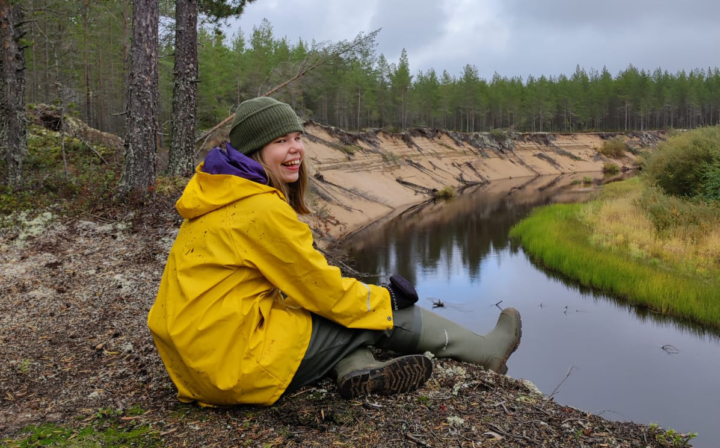Karoliina Lintunen’s publication on climate change impacts on Finnish rivers sheds light on seasonal flooding
Karoliina Lintunen can smile with ease, because her first PhD publication as the first author is now out and published. This is the feeling that probably most PhD researchers still remember. Being a scientist is not about instant gratification, it is a profession where one works sometimes for years and years doing measurements, data analysis, writing and correcting before the work is published. Scientific work is also never really complete; there is always the next question mark on the horizon. Karoliina has found that science is the best fitting career for her. “Being a scientist provides freedom. I am able to focus on one thing at a time and I am allowed to develop my knowledge and be professionally excited and interested in topics, that I find interesting on a personal level.” she explains.
The article that Karoliina published now, “Changes in the discharge regime of Finnish rivers” by Karoliina Lintunen, Elina Kasvi, Cintia B Uvo & Petteri Alho (https://doi.org/10.1016/j.ejrh.2024.101749)is based on a large dataset from 36 river measuring stations across Finland. The measurements have been done in some cases since 1910, they are coordinated by Finnish Environment Institute SYKE and carried out by local actors. Data is publicly and freely available for anyone to download in SYKE’s Hertta service. She only used measurements from non-regulated, natural rivers to make sure the changes she sees in the data are not directly human-induced.

The floods are shifting in time
What she sees in the data is that the spring flood events are happening earlier than before – and are not as strong as before. However, the flood events in autumn and winter have become somewhat more common and stronger than in the past. Long story short – the total annual amount of water remains the same, but it takes place at a different time than before, due to the changes in winter temperatures and more frequent freeze-thaw processes. As we tend to say in Finland, winters are not how they used to be, and when the first snow arrives, we never know if it stays on the ground or flows away through the rivers the next day.
“These changes could have impacts for infrastructure planning. At least the management of regulated rivers, such as hydropower areas.” Karoliina explains. For the people who have houses by the river, it may sound like the changes do not cause any immediate harm – if there was no flood damage before with the strong spring floods, can the more widely distributed but smaller floods cause damage? The answer to this is not clear yet. As extreme weather events are becoming more common, flood risk has been predicted to increase in Finland, so the full impacts of climate change on rivers and their floods remain to be seen.
PhD in the field of Freshwater Science
Karoliina works on her PhD in the University of Turku Department of Geography and Geology, under her supervisors Professor Petteri Alho and Adjunct Professor Elina Kasvi, and Assistant Professor Eliisa Lotsari from Aalto University. Her research focuses on the effects of climate change on Finnish freshwater basins. Currently Karoliina is working with a wintertime dataset collected in collaboration with Lotsari and University of Turku since 2014. Scientific research on ice covered rivers is very sensitive to optimal winter conditions to get the data, and the dataset that she is researching is quite unique on the global scale. Karoliina is now focusing on how river ice cover affects flow turbulence, she was one of the co-authors the paper published on this topic by Lotsari in the late 2022. Research reveals what happens under the seemingly calm surface of river ice
Right now is a great possibility to join the Finnish Freshwater research through the DIWA PhD Pilot. There are several exciting positions open in our partner universities. Karoliina’s research is a good example of the benefits of multi-organization PhD, where she can benefit from data and knowledge from the quality institutions and organizations that are partners to Freshwater Competence Centre and DIWA.

